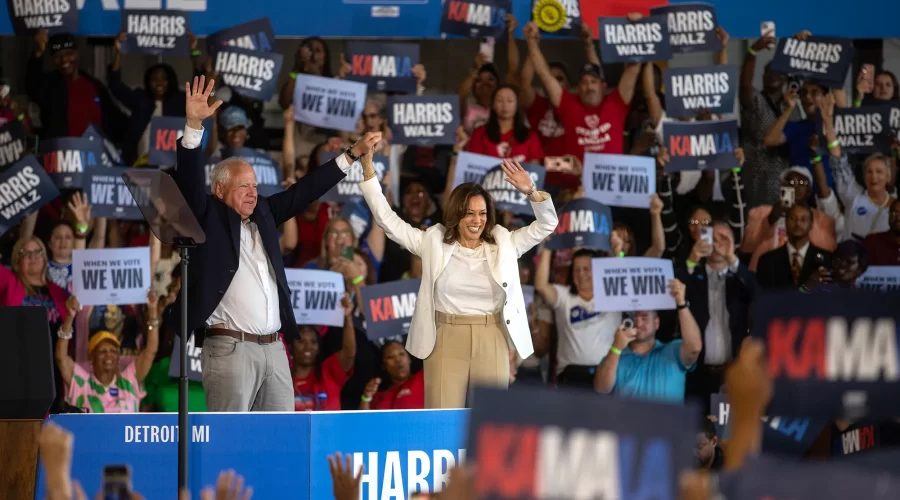The vice president must defend her California roots and record against attacks by the Trump campaign. Voters and politicians in the swing states of Michigan and Arizona say that may not be the deciding factor.
A pair of ceiling fans spun lazily inside the jam-packed hangar as the sun blazed down on thousands of supporters outside. As the crowd of 15,000 — the largest of the 2024 Democratic presidential campaign — waited for Vice President Kamala Harris, some began to faint.
That didn’t stop the supporters from bursting into waves of deafening cheers that lasted two minutes as Harris took the stage. It was what her new running mate, Minnesota Gov. Tim Walz, called a “warm Midwestern welcome.”
“OK, come on, we’ve got business to handle,” she finally said.
The rally outside Detroit on Wednesday afternoon marked the third stop on a five-day, cross-country tour to woo voters in battleground states, which began in Pennsylvania when Harrisintroduced Walz as her vice presidential pick. The duo plan events in North Carolina and Georgia before rallies tonight in Arizona and Saturday in Nevada, and they plan to close out the week in California with a high-dollar San Francisco fundraiser on Sunday.
The Harris campaign has jolted the Democratic base in the three weeks since President Joe Biden dropped out and endorsed her, bringing in record amounts of money and drawing massive audiences.
Although California has sent three Republicans to the White House, it has never produced a Democratic president. Several tried — including former Gov. Jerry Brown, whom critics nicknamed “Governor Moonbeam,” and Harris herself in 2019. Some political strategists blame the sorry track record in part on the Golden State’s liberal image.
Can Harris finally break through in 2024?
To reach the White House, she may need to overcome any California-ness qualms, and must aggressively defend her California record against intense attacks from former President Donald Trump’s campaign. In a new 1-minute ad released Thursday, Harris leaned heavily into her Oakland upbringing and her California prosecutor career. She also agreed to the first debate with Trump, on Sept. 10.
Harris’ California roots are already under attack. Labeling her as a “California radical” and “San Francisco liberal,” Republicans have hammered her stances, particularly on crime and immigration. Sen. JD Vance of Ohio, the GOP nominee for vice president, is trailing Harris’ travels this week and holding press events to criticize her. Trump told reporters at Mar-a-Lagoon Thursday: “She destroyed the state of California along with Gov. Gavin Newscum,” he said, using his pejorative for Newsom.
Harris has backed away from some of her more liberal campaign promises from 2019 and no longer supports a fracking ban or a single-payer health care system. But she must also navigate criticism from progressive Democrats, who want her to go further than Biden on abortion and climate policies.
Her California ties have given some undecided voters pause, but those connections are likely not the deciding factor, according to 20 voters, consultants, officials and political experts interviewed by CalMatters in some of Michigan and Arizona’s most purple districts. And some voters and experts argued that Walz’s Midwestern roots could help balance the ticket.
“People will understand through the Walz lens that Kamala, it doesn’t matter where she’s from geographically,” said Democrat Carl Marlinga, who is running for Congress in Michigan’s competitive Macomb County. “Maybe she says things a little differently, but she wouldn’t have picked a guy like us if she didn’t want to connect with people like us.”
Growing up Republican in Michigan, Michael Taylor knows well a common Midwestern conservative sentiment toward California: His mother often told him the state is a “hellscape” detached from the rest of America, with rampant crime, illegal migrants and unfettered homelessness — even though he said he disagrees.
“There’s a lot of … media portrayal that the West Coast liberals are just out of touch and don’t really know what’s going on in the heartland,” said Taylor, mayor of Sterling Heights since 2014.
His blue-collar city of 132,000 is home to four automotive assembly plants. Thursday, Harris spoke at a Detroit rally hosted by the United Auto Workers, which endorsed her last week, citing her “proven track record of delivering for the working class.”
Sterling Heights is in Macomb County, the quintessential swing county where disillusioned Democrats ditched their party for Republican President Ronald Reagan in the 1980s. The county went for Democrat Barack Obama twice before favoring Trump in 2016 and 2020. Taylor, who now identifies with neither major party, supported Trump in 2016 but voted for Biden in 2020.
California is perceived as elitist and progressive and seems distant to a lot of Macomb County voters, sometimes even himself, Taylor said.
“I sense that from talking to Republicans. There’s this conflict between the real America and the America of the little blue islands along the coasts,” he said. “When you talk to some people, they almost act like California is a different country.”
That’s true for Republican Cheryl Costantino, a teacher in Macomb County’s Shelby Township: “To us, California is like its own weird, liberal place where people poop on the sidewalks and live in tents.”
McClellan Grote, a registered independent and nuclear engineer from Gilbert, Arizona, hesitates to vote for Harris. Although he supported Trump twice and still favors his policies, Grote said he must vote against Trump’s vitriol. But he’s reluctant to support Harris, partly due to the liberal image of California and Newsom, who Grote also calls “Newscum.”
That perception represents a “key vulnerability” that Harris must overcome to win moderate voters, said Matt Grossmann, a political science professor at Michigan State University. Historically, Black and female candidates are considered more liberal than white men, he said, and Harris’ history representing a largely Democratic state, particularly in the U.S. Senate, may cement that impression. Republicans are hoping to cash in on that exact sentiment. In a National Republican Senatorial Committee memo, executive director Jason Thielman deemed Harris a “radical” from San Francisco.
While it’s too soon to tell if those attacks have dented her support, Grossmann noted that down-ballot Democrats in swing states have suffered in previous elections when tied to former House Speaker Nancy Pelosi of San Francisco. “That gives (us) a reason to expect that the same attacks would be successful against Harris,” he said.
The person who may help counter those critiques is Walz, whom Democrats are counting on to help connect with Midwesterners with his rural roots and his background as a gun owner, hunter, public school teacher and veteran. The Trump campaign, on other hand, quickly tried to paint Walz in an emailed statement as a “West Coast wannabe” who wants to spread “California’s dangerously liberal agenda.”
Sue Stella Yu covers politics for CalMatters, with a particular focus on campaigns, elections and voters.
Peace, peaceblished with permission of calmatters.com





